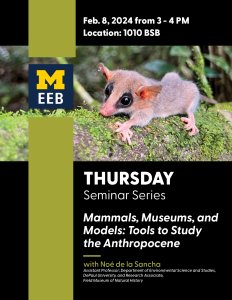Presented By: Ecology and Evolutionary Biology
EEB Thursday Seminar Series - Mammals, Museums, and Models: Tools to Study the Anthropocene
with Noé de la Sancha Assistant Professor; Department of Environmental Science and Studies, DePaul University, and Research Associate, Field Museum of Natural History

This event is part of our ongoing Thursday Seminar Series.
Preview: We are currently in the middle of the sixth mass extinction. One of the main factors affecting biodiversity patterns of mammals is the change and fragmentation as a function of anthropogenic disturbance. For this talk about the various approaches, we have used to improve the understanding of mammal biodiversity patterns with different foci ranging from populations, communities, landscapes, to biogeographical scales. Our approach includes research based on fieldwork, scientific museum collections, and statistical and spatial modeling. Biodiversity patterns vary by scale and various scales have specific effects for different species. I will discuss some results from studies in tropical systems and in urban habitats. As a result of our research, we have found that: 1. The basic natural history and ecology for most of the mammalian fauna is still poor (even for common urban species); 2. Generalist mammalian species tend to benefit from disturbance; however, not all generalists are the same and these vary within and between habitats; 3. Habitat edges are important for local biodiversity patterns; 4. Various types of models and approaches have pros and cons to identify sites important for conservation and or connectivity in poorly studied systems. The need for more fieldwork at different temporal and spatial scales is evident and thus emphasises the importance of field- and museum based research.
Website: http://www.noedelasancha.com
Preview: We are currently in the middle of the sixth mass extinction. One of the main factors affecting biodiversity patterns of mammals is the change and fragmentation as a function of anthropogenic disturbance. For this talk about the various approaches, we have used to improve the understanding of mammal biodiversity patterns with different foci ranging from populations, communities, landscapes, to biogeographical scales. Our approach includes research based on fieldwork, scientific museum collections, and statistical and spatial modeling. Biodiversity patterns vary by scale and various scales have specific effects for different species. I will discuss some results from studies in tropical systems and in urban habitats. As a result of our research, we have found that: 1. The basic natural history and ecology for most of the mammalian fauna is still poor (even for common urban species); 2. Generalist mammalian species tend to benefit from disturbance; however, not all generalists are the same and these vary within and between habitats; 3. Habitat edges are important for local biodiversity patterns; 4. Various types of models and approaches have pros and cons to identify sites important for conservation and or connectivity in poorly studied systems. The need for more fieldwork at different temporal and spatial scales is evident and thus emphasises the importance of field- and museum based research.
Website: http://www.noedelasancha.com